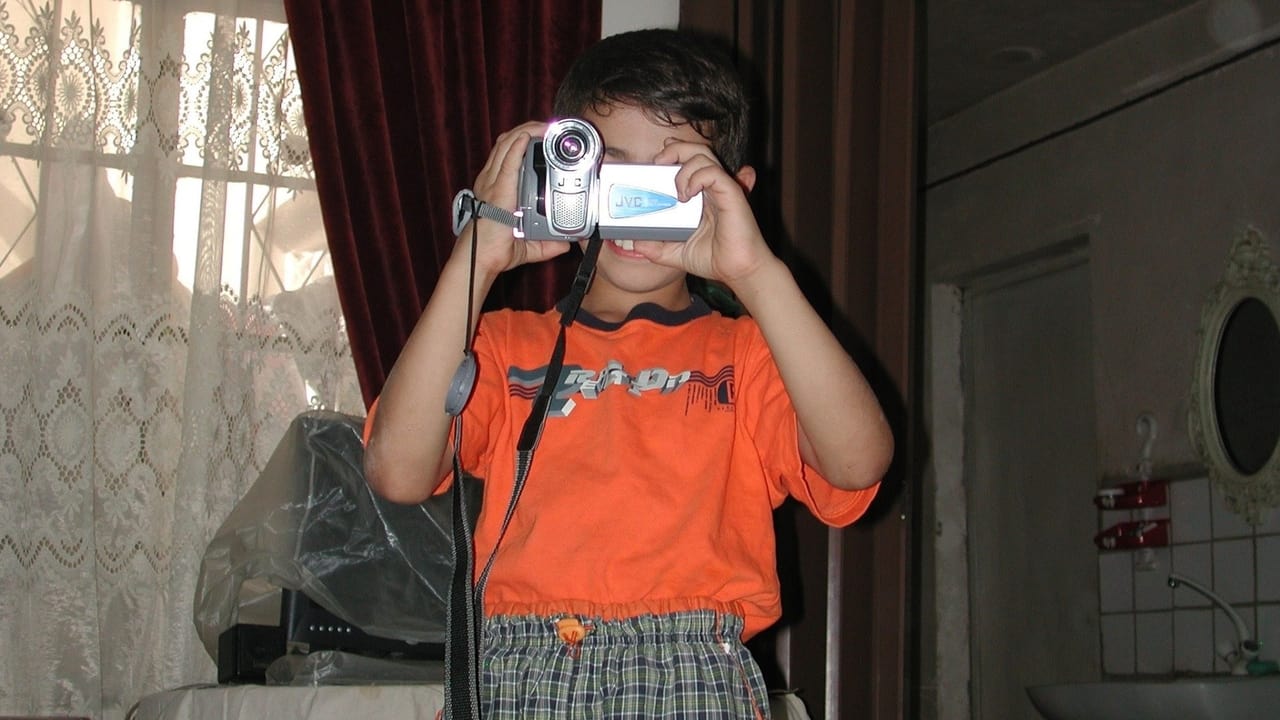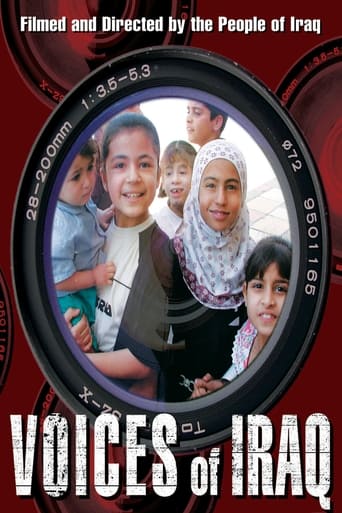2hotFeature
one of my absolute favorites!
Ogosmith
Each character in this movie — down to the smallest one — is an individual rather than a type, prone to spontaneous changes of mood and sometimes amusing outbursts of pettiness or ill humor.
Bluebell Alcock
Ok... Let's be honest. It cannot be the best movie but is quite enjoyable. The movie has the potential to develop a great plot for future movies
Benas Mcloughlin
Worth seeing just to witness how winsome it is.
David Benson
In a world bombarded with slickly packaged rhetoric and insulated from reality by an out-of-date and dysfunctional media, this is a refreshing dose of authenticity. More than anything else, it gives the viewer a rich experience of real human beings, who stand in contrast to the vague two-dimensional characters who populate our public imagination.Clearly, a certain degree of subjectivity creeps into the presentation through the selection of what interviews to publish and how they should be edited. Also, the producers of the film insert file footage from insurgent propaganda and Baath regime atrocities. (herein lies my only caveat: there is some extremely graphic footage). However, I would say at least that if Michael Moore's work is valid documentary, or the TV networks' coverage is valid journalism, this work surpasses both.Some of the other commentary on IMDb has claimed that too many people in these interviews express 'pro-Bush' sentiments. This is a parochial concept. Expressions of hope and optimism for one's national and personal prospects need not be 'pro-Bush' or even 'pro-American'. Instead, I would submit that what we are seeing is Iraqis' genuine pride and confidence in *their own* people and their commitment to better themselves.The bottom line is that what the viewer sees is real (and interesting) people expressing their real thoughts and feelings. If these very human stories and images don't evoke your emotion and sympathy, then you should take your stone heart elsewhere.
Chris_Docker
It's hard not to go to a movie called Voices of Iraq without bringing your personal views about the war, but it is a film with a value that goes beyond political.150 video cameras were distributed to ordinary Iraqis over the summer of 2004. The resulting 400 hours of film were collected and edited down to about 80 minutes, subtitled, produced with Ango-Iraqi hip-hop music, occasionally cut with graphic footage from Saddam's regime, and overlaid with U.S. newspaper headlines or occasional explanatory notes. If has a fresh feel to it - if not exactly a tourist promotion video it does let you hear a large number of Iraqis talk about their country in their own words and a variety of locations that a Westerner would have difficulty visiting. What I liked best about it was seeing men, women and children with real hopes and dreams in such a devastated country, genuine smiling faces even in adversity, and some of the love and warmth of local people that is so easily forgotten when we only see footage of a war-torn country. "I hope the world will see our smiles," says one, and it is a beautiful image, far from the stereotype of the terrorist, religious spokesman, insurgent, or politician.Voices of Iraq includes some very moving interviews. A Kurdish woman, restraining her tears as she recalls it, says how she started smoking at University and also regularly burning herself with cigarettes. Why? So she could be 'prepared' for when she was tortured. There were many reminders of the millions that Saddam tortured and killed. One man jokes about wanting to be tortured at Abu Ghraib, comparing the minor violations there to the horrific tortures exacted by Saddam Hussein.Media headlines from the U.S. press are contrasted with opposing footage. For instance, a banner reading, "Militia force people to stay at home" introduces scenes of a vibrant, bustling street-market.For anyone who has served in Iraq, or their friends and family, this is an uplifting film, and in many ways makes a more believable case for the invasion than the politicians on TV. For an upbeat (if not totally pro-American) view of the war it is positive and genuine. To watch it in the same afternoon as Fahrenheit 9/11 (if you are sufficiently open minded) might even persuade you there is no complete right or complete wrong.But like Michael Moore's inflammatory anti-invasion film, Voices of Iraq is flawed and cannot claim to be as impartial or unbiased as it would like, simply because the people speaking on it are Iraqis. We have no way of knowing how it was edited - certainly there is no claim to have used a sociologically sound sampling method and to do so would possibly have made uninteresting viewing, but to suggest it was 'made' by the people of Iraq is disingenuous. Whilst the footage was shot by Iraqis, the editing, and hence any message to be distilled from that large amount of film, was done by an ex marine and his two NY colleagues with MTV experience.Voices of Iraq fills a necessary hole in our understanding as long as it is not viewed unquestioningly. It enables you to feel warmer towards Iraqis as people. If it does 'support the position of the Bush administration' (as some have claimed) that's not sufficient reason to dismiss it.At the Edinburgh International Film Festival UK premiere, Voices of Iraq was screened with a short called, 'Where is Iraq', which likewise has informal interviews with Iraqis, filmed by an Iraqi-Canadian. It provided some balance (as there were more anti-American views than pro) but itself suffered from the same problem - that if you interview enough people you will get the views you want.Whatever your feelings about Iraq, it is still a country of real people, individuals like you or me. Voices of Iraq brings that a little bit closer.
KelsoKing
I had never been motivated to submit a comment before seeing this film and reading the IMDb comments about it. The movie portrayed such a different attitude within Iraq than I expected that I could hardly wait to see what others had to say about it. The first thing I noticed in reading the comments was how some used their "comment" as a forum to attack "the left" rather than discuss the merits of the film. Those from the left suggested that this film may only show one side of the story.Sitting here in the USA, I have been frustrated by being unable to know what the real story is inside Iraq, so I was anxious to see this film. As others have said, it is definitely worth watching. It is an intimate, revealing and touching portrait of Iraqis and what it is like to live in Iraq. However, as I watched the film I couldn't help wondering who had made it and how accurate it is.While it is suggested or implied that all of the footage contained in the film was shot by private Iraqi citizens, this is not actually the case. The film also includes archival footage of torture and genocide perpetrated by Saddam Hussein and his regime. In addition, newspaper headlines are shown at different times during the film that appear to be designed to show how different the newspaper accounts were from what the film is showing. I'm not saying that any of this was inaccurate but it added subjectivity to the film that went beyond Iraqis expressing their views "in their own words" and "telling their own story" as the promo material suggests. To me this "editorializing" suggested and revealed a specific bias in the film.Furthermore, promotional material for the film states that "the producers of Voices of Iraq distributed over 150 digital video cameras across the entire country to enable everyday people - mothers, children, teachers, sheiks and even insurgents - to document their lives and their hopes amidst the upheaval of a nation being born." This is not really accurate. While the film does contain video footage of mothers, children, teachers and sheiks that was shot for the film, as stated, the video footage of "insurgents" was not shot for the film but shot by the insurgents themselves for their own purposes, whatever those may have been. Furthermore, the insurgent footage was not an interview at all but rather footage only of someone's hands wiring a bomb. Contrary to what was advertised, no information or opinion from the insurgent perspective was included in the film at all. Regardless of whether it is right or wrong, this is a significant perspective but one that was not addressed in the film and is not often addressed in Western media.All in all, I thought the movie was interesting and informative but couldn't help wondering what was contained in the 400 hours of footage that were left on the cutting room floor. As someone else said, I suggest that you watch the movie, do your own research and draw your own conclusions. For a different perspective on this situation watch "Control Room."
joshuwon
In their own words the Iraqi people describe their lives under Saddam and after the American invasion. While some reviewers claim this is US-sponsored "propaganda", I would say that scenes of Iraqi women weeping over their family members accidentally killed at a US checkpoint put that distortion to bed.Then there are the well-to-do Iraqis who would like to go back to the way things were under Saddam.Don't forget the Shiek who is extremely critical of the Coalitions forces for "kicking in doors" in Fallujah and "killing people, not just muhajadeen." Yes, the documentary is distributed (not produced or conceived) by Voice of Freedom but only because no Hollywood studio or video distributor would touch it.Why? Probably because they are only interested in continuing the big lies of Michael Moore and the left-wing press in furtherance of their political objectives.They would rather you think that Iraq is some chaotic battlefield where terrorists are fighting on behalf of the Iraqi people against an oppressive imperial American army. If you are of this mind-set then this movie is not for you, go re-watch F 9/11 or some other conspiracy piece because you aren't ready yet.What you will see in this film is Iraqis going about their daily life, something you won't see on the TV news, where "if it bleeds, it leads".Obviously Iraqis claiming that Saddam was supporting Al Qaeda and that they were "all over the country, flush with money" have to be taken with a grain of salt.However, the Feedayen torture and execution videos or footage of Saddam's palaces packed with Unicef Food Aid boxes, Porsches and cases of expensive liquors will be an eye opener for most people.Then there are the interviews with Saddam's former torture victims, the man who attempted to assassinate Uday Hussein, college graduates, Marsh Arabs attempting to recover from genocide and many others who appreciate the freedom our soldiers have given them.Seeing the testimonies of ordinary Iraqis just one day after their first free elections was inspiring and humbling. How Americans can watch this and not be moved to aid those around our planet who are truly oppressed and truly tortured is beyond me.Perhaps it time to abandon our selfish cynicism and emotional irony, see with a clear eye and act from a pure heart. Bush was right: the seed of democracy is planted in the Middle East and will never be uprooted.

